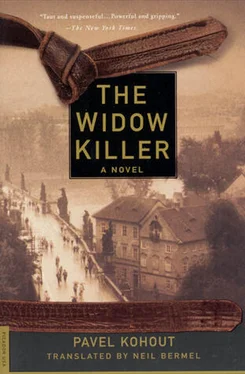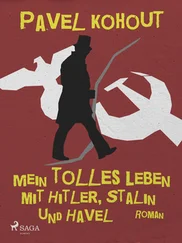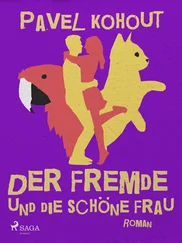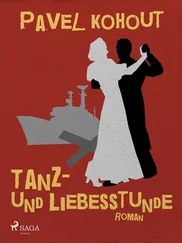Pavel Kohout - The Widow Killer
Здесь есть возможность читать онлайн «Pavel Kohout - The Widow Killer» весь текст электронной книги совершенно бесплатно (целиком полную версию без сокращений). В некоторых случаях можно слушать аудио, скачать через торрент в формате fb2 и присутствует краткое содержание. Год выпуска: 2007, Издательство: St. Martin's Press, Жанр: Современная проза, на английском языке. Описание произведения, (предисловие) а так же отзывы посетителей доступны на портале библиотеки ЛибКат.
- Название:The Widow Killer
- Автор:
- Издательство:St. Martin's Press
- Жанр:
- Год:2007
- ISBN:нет данных
- Рейтинг книги:5 / 5. Голосов: 1
-
Избранное:Добавить в избранное
- Отзывы:
-
Ваша оценка:
- 100
- 1
- 2
- 3
- 4
- 5
The Widow Killer: краткое содержание, описание и аннотация
Предлагаем к чтению аннотацию, описание, краткое содержание или предисловие (зависит от того, что написал сам автор книги «The Widow Killer»). Если вы не нашли необходимую информацию о книге — напишите в комментариях, мы постараемся отыскать её.
The Widow Killer — читать онлайн бесплатно полную книгу (весь текст) целиком
Ниже представлен текст книги, разбитый по страницам. Система сохранения места последней прочитанной страницы, позволяет с удобством читать онлайн бесплатно книгу «The Widow Killer», без необходимости каждый раз заново искать на чём Вы остановились. Поставьте закладку, и сможете в любой момент перейти на страницу, на которой закончили чтение.
Интервал:
Закладка:
“No!” he nearly snapped, and bristled again, but right away he realized that there was no reason to; after all, it was he who had started the personal questions, and he did not want to behave like a member of a master race. So he added, “My wife and daughter were killed last year in an air raid.”
Darkness had long since enveloped the car, but when he heard nothing and turned his head to his companion, he saw sympathy in the boy’s eyes. The reaction surprised and nonplussed him, and they sat staring at each other this way for a few long seconds before the Czech spoke again.
“I’m truly sorry, Mr. Buback.”
He did not remember when anyone last confused him as much as this young man, and the only thing he could think to say was “Thank you.”
In Brno they stopped at the vintner’s hotel, and the horrified clerk, stammering, corroborated the facts. The onetime sadistic murderer, now tender paramour to two generations of women, was in the clear, and they were back where they had started.
The two of them spent the remainder of the trip in the back seat, half asleep, half awake. Litera could only drive as fast as the narrow beams of the car’s blue-painted headlamps permitted. Buback was silent. From time to time he fell into phantasmagoric, contentless dreams, only to wake staring over the unmoving shoulders of the driver into an inky darkness, unbroken by the blacked-out towns that seemed more like stage sets.
Long past midnight he heard the driver’s voice informing the rear of the car that they were in Prague; where should he drop them off? Buback nearly answered in Czech and froze: to his surprise, he was less frightened of losing his secret advantage than he was of looking foolish in front of his traveling companion. The Czech deferred to him, and in his fatigue Buback made a further slip when, quite irregularly, he gave his home address. He tried to make up for it by getting out at the very foot of the road. With a brisk good-bye, he headed up the steep slope on foot.
The Czechs now called this neighborhood Little Berlin. What had mostly been Jewish homes were now apartments for functionaries sent here from the Reich. Buback had arrived late, and the only place left for him was an attic studio in a turn-of-the-century house occupied by the chairman of the Prague Volksgericht—“People’s Court“—and his large family. They had been overjoyed when he asked for the key to the servants’ staircase in the back; it meant he barely ever saw them. Several times, however, the judge had given him a lift to work in his official car, which passed the Gestapo building on its way to the Pankrác prison.
During these rides the corpulent judge, sweating despite the winter cold, would haltingly ask Buback’s opinion on the state of the war. As a matter of principle, Buback hewed to the editorial line of the Völkischer Beobachter in his answers: the situation on the battlefield was not a reliable indicator, since the brilliant and therefore unpredictable hand of the Führer would make the decisive move, as it had many times before. The judge would enthusiastically echo him, and later, on the evening radio program, Buback would hear news of his neighbor’s fresh successes at work, as reflected in the number of new executions.
Now, as he reached the top of the street, he noticed hushed sounds and movements in front of his darkened house. He halted; for the first time the thought occurred to him that these days, with the advancing front so close, he should be carrying a pistol. The voices were German, however, so he decided to approach them. A large, bulky shadow resolved into a moving van; four strapping fellows were hoisting a long piano into it. Before Christmas Eve dinner last year, his neighbor’s wife had played carols on it and boasted that it was a famed Steinway, left behind by the original owners. Even the men’s blacked-out flashlights showed Buback that the capacious interior of the van was almost full.
Another hulk loomed out of the darkness and barked at him, “What are you doing here?”
“What are you doing here?” he coldly retorted. “This is where I live.”
The man, doubtless an officer in civilian clothes, took him for an ordinary Aryan he could push around a bit.
“Your documents!”
“It’s all right, officer,” a muffled voice called breathlessly; the judge was rushing over to them. “That’s Herr Buback, the chief criminal detective; he’s our neighbor. Good evening, Herr Buback.”
“Evening…,” Buback said, and continued to observe the scene until the import of it hit him.
“My mother-in-law“—the words tumbled out of the judge—“has taken seriously ill, and my father-in-law is alone in the Black Forest, so my wife is going to look after her parents….”
Buback could understand why this man, who had ample reason to fear for his own skin, would send his family to safety while there was still time. However, the sight of the Reich’s local judiciary chief looting the house with the aid of his wardens took Buback’s breath away. For the second time that night he was at a loss for words, and silently watched the grand piano vanish into the van.
“The children are just learning to play,” the judge hastened to explain, desperate for an excuse. “We don’t want them to be out of practice by the time they come back here….”
You rat, you dirty rat, Buback thought angrily; bloodthirsty rats like you provoked all of Europe until it united against us and now you’re the first to leave the ship with your plunder. He lunged toward the back entrance so suddenly that the cowed overseer barely managed to step out of his way. The judge who had sent hundreds to the firing squad and under the knife called after him almost beseechingly.
“Herr Buback! I have permission from the office of the Reich’s protector, and of course I personally will remain at my post—”
Buback put all his venom into slamming the door; the blow shook the house, but he knew that no one was asleep there anyway. The judge’s spouse and children were doubtless safe in a government car, racing westward through the darkness.
The army advanced toward its historic engagement while this cowardly capitulator snuck away. The thought upset him so greatly that he could not even think about sleep. He ferreted out an unfinished bottle of brandy from the cramped kitchenette and poured it straight down his throat. The pressure in his skull immediately lessened; agitation gave way to a woolly exhaustion. Then he noticed an envelope lying on the parquet flooring near the door.
He ripped it open and read Kroloff’s news.
Morava was shocked to find Jitka up so late. “What’s wrong?”
“With me? Nothing. Just waiting for you.”
“But I had no idea when we’d be back. We could have been stuck there for days.”
“Didn’t you get Beran’s message?”
“No, was there one?”
“I telexed it to the police station there after lunch.”
“Aha,” he realized. “The local cop was with us the whole time. And what did it say?”
“He did it again. The butcher.”
“No! When?”
“Yesterday. Actually the day before, but they only found her yesterday.”
“Who? Where?”
She summarized the latest gruesome tale for him as if they were still at the office. The fire in the ground-floor apartment on Podskalska Street (building 131 in the district register) went unnoticed until relatively late, because the remodeled kitchen had no window. Although the blaze remained localized, the affected apartment was almost completely burned out. The partially charred body was apparently that of the tenant, Barbora Pospíchalová. But yesterday at noon, at the court medical department, a finding turned the investigation on its head: before the fire broke out, the woman — identified by her jewelry and teeth — had been brutally murdered and mutilated in exactly the same manner as the German baroness. The firemen had unfortunately destroyed all the evidence with a stream of water, and then, when they carted the smoking remains off to the dump with the rest of the wreckage, the sliced-off breasts disappeared as well. The missing heart confirmed the link between this brutal murder and the preceding one; the killer had evidently taken the organ with him.
Читать дальшеИнтервал:
Закладка:
Похожие книги на «The Widow Killer»
Представляем Вашему вниманию похожие книги на «The Widow Killer» списком для выбора. Мы отобрали схожую по названию и смыслу литературу в надежде предоставить читателям больше вариантов отыскать новые, интересные, ещё непрочитанные произведения.
Обсуждение, отзывы о книге «The Widow Killer» и просто собственные мнения читателей. Оставьте ваши комментарии, напишите, что Вы думаете о произведении, его смысле или главных героях. Укажите что конкретно понравилось, а что нет, и почему Вы так считаете.












